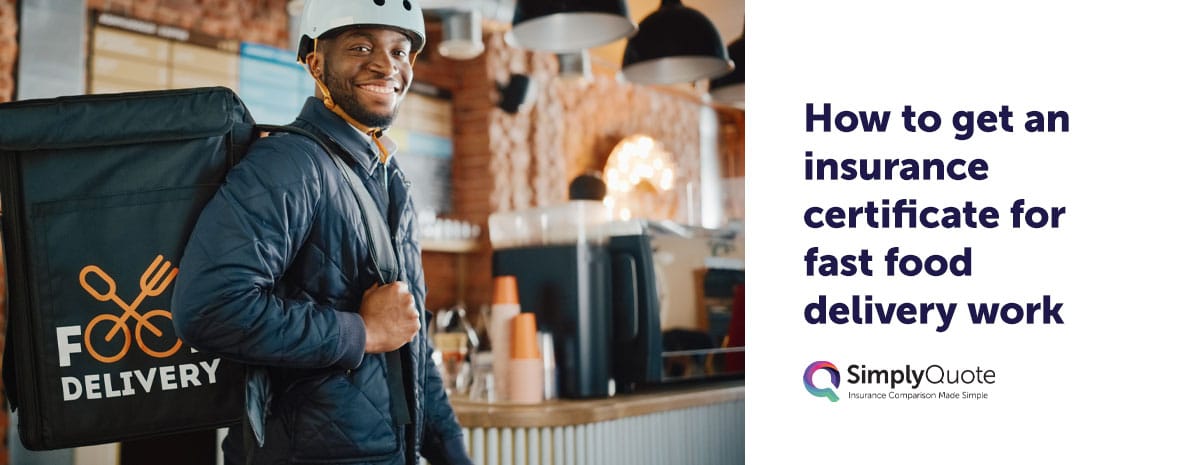How to get an insurance certificate for fast food delivery work
Fast food delivery drivers – or food couriers – get their insurance certificate from their insurance provider.
It’s a document that proves you have the correct car insurance policy in place, including hire and reward cover (i.e. you deliver goods in exchange for cash). It ensures the food delivery driver is legally compliant to drive and deliver food within the UK.
The certificate summarises the key details of your car insurance policy and stipulates the type of insurance cover you have, which vehicle you drive, and how long the policy is valid.
Without it, you may receive a £300 fine and six penalty points on your licence.
We’ll cover all the nitty gritty details in this article.

What are the requirements of a food delivery insurance certificate in the UK?
To deliver food in the UK, you must have:
Social, domestic and pleasure (SD&P) insurance
- Legally required for any vehicle on UK roads.
- Covers everyday, non-work-related use of your vehicle.
- Does NOT cover fast food deliveries.
Hire and reward (H&R) insurance
- Also called Class 3 business insurance or courier insurance.
- Legally required to carry food in exchange for payment.
- Covers you while using your vehicle for food delivery work.
- Can be purchased as a separate policy or combined with SD&P.
- Three levels of cover to choose from – more on this shortly.
What are the eligibility criteria?
- Drivers must be at least 23 years old.
- They must have a valid EU/UK driver’s licence.
- They must be legally allowed to live and work in the UK.
Looking for cheap food delivery insurance? Get your quote today!
Get QuotesHow do I get food courier insurance?
To get a food delivery insurance quote from SimplyQuote, you must provide a few basic details:
- Name
- Age
- Address
- Mode of transport – scooter, car, van
- Vehicle info – e.g. make, mode, size, registration details
- Food delivery schedule (i.e. working hours)
When can I apply for an insurance certificate for fast food delivery work?
You can apply for an insurance certificate after you’ve signed up for SD&P and H&R insurance with a chosen insurer. The insurance company/broker will issue your insurance certificate within minutes of policy approval.
Why do I need an insurance certificate for fast food deliveries?
Anyone delivering food in the UK, whether it’s a casual, part- or full-time job, requires fast food delivery insurance. It’s a step above standard car insurance, allowing you to transport food commercially. It’s a non-negotiable.
Who needs a food delivery insurance certificate?
- Uber Eats drivers
- Just Eat drivers
- Deliveroo riders
- Stuart drivers
- Any takeaway food delivery driver transporting food in exchange for cash.
Bonus read: How To Become A Food Delivery Driver.
What does fast food delivery insurance cover?
Standard delivery insurance for food couriers includes:
- Public liability – protects you if you injure someone (or damage their property/vehicles) when out on delivery.
- Employer liability – covers compensation costs should an employee claim against you. This is a legal requirement if you hire food couriers, even if they are casual workers.
- Goods in transit liability – protects the goods (a.k.a. food) you are transporting while on the job against loss, damage or theft. Usually, it won’t cover personal items like wallets, GPS devices and other personal possessions.
- Accidents – protects you and your vehicle in the event of a collision.
What isn’t covered?
- Driving with a suspended/expired licence.
- Driving under the influence of alcohol or illegal drugs.
- Normal wear and tear of the vehicle (e.g. brake pads).
- Unnamed/uninsured drivers.
- Personal belongings.
- Using the vehicle for other commercial purposes (e.g. working as a taxi driver).
- Costs incurred due to negligence (e.g. leaving keys in the ignition and the vehicle is stolen).
Can I add optional extras to my policy?
Yes, you can! Here’s a list of what you can include:
- Breakdown
- Courtesy car
- Windscreen protection
- Misfuelling
- Lost key
- EU/International
- Loss of earnings/income
- Personal belongings
- Legal expenses
- Employers’ liability – a legal requirement if you employ staff
Are there different types of delivery insurance for food couriers?
Yes, there are! Here are some different types you can get:
- Pay-as-you-go (PAYG) policies: Offer flexibility for casual or part-time delivery drivers who work less than 20 hours per week. You only pay for insurance cover when needed, usually on an hourly basis. Choose between third-party only or comprehensive cover.
- 30-day policies: Ideal for seasonal food couriers who need short-term insurance cover. Charged in monthly instalments, hence the name.
- Annual policies: Ideal for full-time food delivery workers working all year round. Generally includes SD&P.
What levels of food delivery insurance do you get?
Like any standard insurance, food couriers have three options:
- Third-party only (TPO): Covers third-party goods, persons and vehicles.
- Third-party, fire and theft (TPFT): Includes TPO, fire damage and vehicle replacement if stolen.
- Fully comprehensive: Includes TPO and TPFT, personal vehicle repairs/replacement and other added benefits (malicious damage, GPS devices, windscreen cover, etc.).
Final thoughts
Having social, domestic pleasure and hire and reward insurance enables you to obtain your insurance certificate, permitting you to deliver food in the UK. Whether you transport food by car, moped, scooter or van, having the correct level of insurance is essential.
Contact SimplyQuote or use the online comparison tool to find the best insurance deals from leading UK insurers today!
Happy delivering!
Frequently Asked Questions
An insurance certificate is a legal document that summarises your car insurance policy. It confirms that your vehicle is used for hire and reward, and food delivery purposes. It’s a legal requirement for all food couriers in the United Kingdom to have the correct level of insurance.
No, it’s against the law for food couriers to work without the right insurance. If caught, you are liable for a £300 fine, penalty points and the risk of suspending your licence.
The price of food courier insurance depends on the type of policy you opt for and other criteria – driver’s age, claims history, working schedule, etc. Here’s an estimation:
- Pay-as-you-go policy = £0.80 per hour
- Monthly policy = £50 – £140 per month
- Annual policy = £850 – £1,100 per year
There are several ways to lower your delivery insurance premiums:
- Compare quotes from multiple insurance providers.
- Pay annually as opposed to monthly.
- Opt for telematics technology.
- Secure the vehicle/s when not in use – alarms, locked garages, etc.
- Choose the level of cover you need.
- Reduce your mileage.
- Avoid vehicle modifications.
- Maintain a clean driving history.
